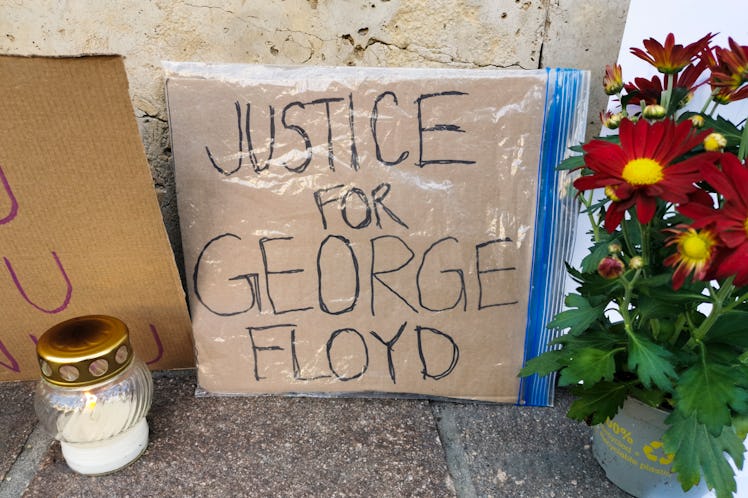
Here's How To Make Sure Your #BlackoutTuesday Post Doesn't Detract From Black Lives Matter
People around the world are observing #BlackoutTuesday on June 2 in solidarity with black victims of police violence. The social media campaign has taken off, but it hasn't been without controversy. Before you post a black square on your Instagram, there is more you should know about how to support the black community, so you can participate in #BlackoutTuesday and still help move the Black Lives Matter movement forward, rather than detract from it.
According to Rolling Stone, music executives Jamila Thomas and Brianna Agyemang started the initiative to have the music industry refrain from posting as they normally would on social media on Tuesday, June 2 to draw attention to how to support the black community. The move comes after a weekend of nationwide protests following the death of a black man, George Floyd, at the hands of police in Minneapolis, Minnesota, on Monday, May 25. Video of the incident showed a white officer, later identified as Derek Chauvin, kneeling on Floyd's neck while Floyd repeatedly said, "I can't breathe." According to court documents, prosecutors allege Chauvin had his knee on Floyd's neck for nearly nine minutes. All four officers at the scene of the incident were fired, and Chauvin was charged with third-degree murder on Friday, May 29. Elite Daily attempted to reach representatives of Chauvin for comment on the charges, but did not receive a response.
In addition to marching in the streets, many people have been participating in Blackout Tuesday by muting their feeds and sharing an image of a black square. People eager to participate should know that posting a black square to their feeds is only the first step: before you post, there are important guidelines to follow so your #BlackoutTuesday post can effect change. (And though it is not the job of black people to educate, there are many black voices and black creators on social media who are sharing these guidelines.) These guidelines include, don't tag Black Lives Matter hashtags in your Blackout Tuesday post, do lift up black voices, and do share useful resources to help educate your followers. Considering the latest criticism of the black boxes, you may also feel more comfortable sharing resources and muting yourself without first posting a black box on your Instagram account.
On Tuesday, Twitter user Raquel Willis, a writer, editor, activist, and speaker, instructed allies to not use the #BLM or #BlackLivesMatter hashtags when posting for Blackout Tuesday. (Many black creators and social media accounts have made similar requests.) Using a BLM or Black Lives Matter hashtag on a #BlackoutTuesday post can hurt more than help, because it fills the #BlackLivesMatter Feed with black squares rather than with the vital information people use to connect during ongoing protests and learn about the movement.
Furthermore, as a non-black ally, if you are going to post a black square, you should not only silence your usual Instagram or social media posts, but as Willis shared in her tweet, you should instead fill that space with "what black people are experiencing." Willis' tweet suggests you share what's happening at protests, and use it as an opportunity to educate your followers. If you don't know where to find resources to do so, this Anti-Racism Resources Google Doc compiled by activists Sarah Sophie Flicker and Alyssa Klein is a great place to start. It's one of many docs being shared widely on social media that you can look to and share useful information with your followers.
Love Island USA cast member Aïssata Diallo also shared information on her Instagram account about on how allies in the Black Lives Matter movement can fully participate in #BlackoutTuesday. Diallo noted that going silent on your personal posts — taking a pause from sharing your art, promoting your music, or any other activity — doesn't mean not speaking up at all. To highlight the voices of the black community, you can share accounts of black creators you follow and resources on how to be anti-racist in your caption or your Instagram Story.
There has been criticism leveled at posting black squares on Blackout Tuesday, and much of it — like Lil Nas X's tweet saying "people need to see what's going on" — is in reference to #BlackoutTuesday posts that use the Black Lives Matter hashtags. It's imperative to keep the Black Lives Matter hashtags out of your post to avoid detracting from the cause, and Instagram user @ckyourprivilege notes that if you have tagged BLM, you'll want to delete your original #BlackoutTuesday post and repost altogether instead of editing the original post with the new hashtags. If you don't delete the post entirely, there is a chance the information will remain in the hashtag search bar which means you'll still be flooding the #BlackLivesMatter hashtag.
As the number of black squares began to grow on Instagram, the criticism grew as well. Some are calling for people to take down their #BlackoutTuesday posts altogether, saying a Feed filled with black squares (and nothing else) is more performative than helpful, while others are still urging people to keep BLM untagged and continue to lift up black voices and resources for allies to educate themselves. Activist Brittany Packnett Cunningham also suggested on Tuesday it is the work of non-black allies to continue to lift up black voices. Both arguments, though, highlight the importance of amplifying black voices and resources, so if you decide to join the cause on June 2 and you're not a black person, make sure you are educating yourself and doing the necessary work to serve — and not harm — the movement.